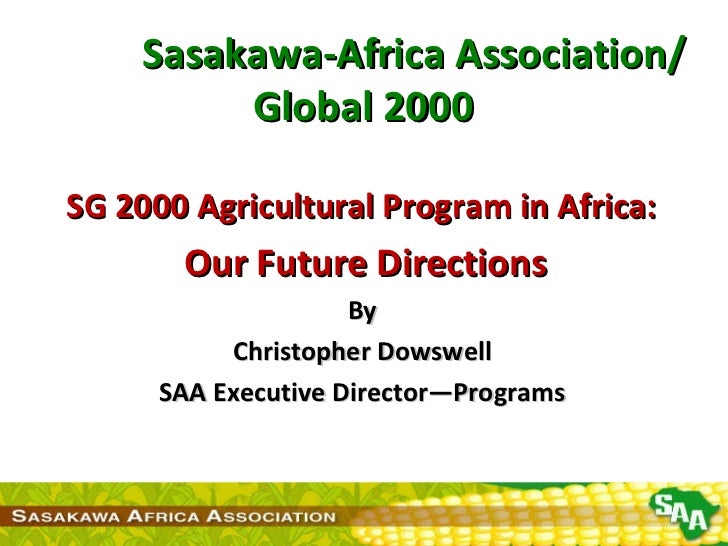 |
| Sasakawa African Association in Africa (SAA2000) |
A cake was cut to celebrate the 30 years of existence of
Sasakawa African Association in Africa (SAA2000) and 25th in Nigeria,
and this brought to the fore the impact it has made in Nigeria agricultural
technologies transfer from the Research Institutes to farmers and processors in
the last 25 years especially when the country’s ADPs extension services is
almost gone extinct, at the departure of the world bank assisted programme.
One of the witnesses at the beginning of SAA2000 about
25years ago, a former permanent secretary in the Federal Ministry of
Agriculture and Rural Development, Mr. A.O Edache in the gathering gave a
picture of how the programme began
through a Memorandum of Understanding (MOU) as he said his initial reluctance to
SAA2000 proposal wearied away when he saw the people behind the idea and the
purpose the programme would serve to fight hunger in Africa and Nigeria
saying “ it is a great thing for me when
25 years ago, Chief Olusegun Obasanjo came to the then agriculture Minister
with a proposal on behalf of this organization which was handed over to me for
appraisal, but then I was not initially convinced based on the support
extension was getting from the world bank which was short lived. But when I
studied the proposal with the caliber of people involved (Dr. Norman Borlaug, father of Green Revolution,
former US President, Jimmy Carter and Chief Olusegun Obasanjo) and the purpose
the MOU will serve the country in terms of food security made me to support it
and a MOU was signed that brought SAA2000 to Nigeria. I can see the emotional attachment
of this organization to the small scale farmers as they have been able to
transfer best practical training to farmers with research based instruction
that is giving high yield of maize as high as five ton per hectare and seven
ton of wheat per hectare. Over 3 million farmers have worked with SAA2000 with
over 2,000 extension programme officers”
However in the last 30 and 25 years of existence in Africa
and Nigeria respectively, Sasakawa2000 at a glance has the following to say-
terms of operation in Nigeria.“For SAA, a milestone has been reached in this
anniversary year with the completion of strategic plan from 2012 to 2016 of
which the architect was the late Christ Dowswell, working with SAA’s managerial
team. In Nigeria, working mainly with and through the extension services
departments (ADPs) of state ministries of agriculture, SG2000 has proved that
given access to technology already available, small-scale farmers can drastically
increase (Triple or quadruple) their yield of food and cash crops.
Thus a
farmer obtaining 1.5t/ha of maize using traditional practice is able to improve
his yield to 4.5-6.0t/ha using the SG2000 productivity enhancing technology.
Sasakawa trained over 4,300 extension agents on different aspects of crop value
chains, trained cumulatively over 5 million farmers including women agro
processors, youths and even persons with special needs, promoted 21 different
post-harvest technologies, established 21 agro processing centers to add value
to crops and linked many crop producers to the market and credit” Through
SG2000 superb education programme, many extension officers who have never
thought of becoming a doctorate holder are now one through its programme
affiliation with many of our universities as over 50 million people in Africa
and Nigeria have been positively affected.
The Managing Director
(MD) SAA2000 Dr. Juliana Rwelamira appreciated the support given for the
organization by all the partnering agencies, the states and federal government
saying more still needed to be done in the face of transferring improved
technologies to farmers for more productivity with high yield to meet food
security and halve bill on importation gulping billions annually in Africa and
Nigeria.
Chief Olusegun Obasanjo and many others farmers, foot
soldiers from the states’ ADPs and Institutions like IAR, NAERLs are given award of excellent performance towards
the success recorded by SG2000 in the last 25 years of operation in Nigeria
that have affected over three million people in the country.










No comments:
Post a Comment